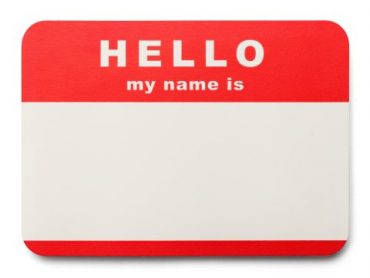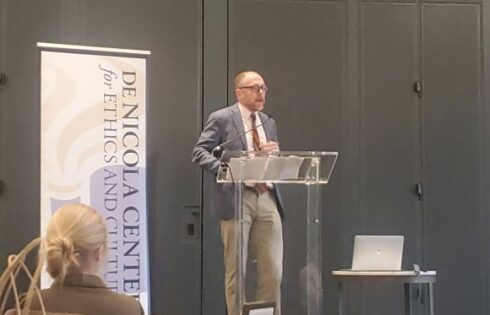
It should come as no surprise, but these days everything in the education realm is somehow viewed through the prism of race, ethnicity, and identity. Even the names of students in your classroom.
Teachers who do not pronounce student names correctly, says education blogger Jennifer Gonzalez, are engaged in a “tiny act of bigotry”: “Whether you intend to or not, what you’re communicating is this: Your name is different. Foreign. Weird. It’s not worth my time to get it right.”
Writing in NEA Today, Clare McLaughlin writes “Names holds ancestral and historical significance for many minority, immigrant and English learning students. Names bring stories, which students are often forced to adapt to an ‘Americanized’ context.”
Yee Wan, current president of the National Association for Bilingual Education (NABE), recalls just that — being “faced with the overwhelming and unfair decision over whether she would keep her native name or change it to something more ‘Americanized’ so “educators would not struggle over the pronunciation.” (Really? How difficult is it to pronounce two one-syllable names?)
More from the NEA Today article:
Overlooking or downplaying the significance of getting a name right, explains Rita Kohli, assistant professor of education at the University of California at Riverside, is one of those “microagressions” [sic] that can emerge in a classroom and seriously undermine learning.
“Names have incredible significance to families, with so much thought, meaning and culture woven into them,” Kohli says. “When the child enter school and teachers – consciously or not – mispronounce, disregard or change the name, they are in a sense disregarding the family and culture of the students as well.” …
The effects can be long-lasting. In 2012, Kohli and Daniel Solorzano examined the issue in a study called “Teachers, Please Learn Our Names!: Racial Microagressions and the K-12 Classrooms.” They found that the failure to pronounce a name correctly impacts the world view and social emotional well-being of students, which, of course, is linked to learning.
“Students often felt shame, embarrassment and that their name was a burden,” Kohli says. “They often began to shy away from their language, culture and families.”
Showing respect, however, doesn’t necessarily require that an educator nails the pronounciation [sic] on the first attempt. “We can’t say every sound or name in the world, but it is how we respond that matters,” says Kohli.
Well, that’s just it —any decent educator isn’t going to make fun of a student’s name (first or last), whether he/she is a minority or not. Particularly long and/or difficult names may take some practice on a teacher’s part, but as long as a good faith effort is being put forth to get a moniker right and not make light of it, a teacher should not be labeled as “insensitive” or a “bigot.”
Being a former foreign language teacher, I am probably more … “culturally cognizant” in this arena so I could be overestimating the assumption that most teachers already are aware of name “sensitivity.” But my personal experience is, with very few exceptions, that educators are quite mindful of kids’ names.
If anything, around halfway through my career I started to “preempt” students on the first day of school by saying “Please do not get upset if I mispronounce your name. It is my first time attempting it. If I get it wrong, please politely correct me.” I did this because some students actually had been reacting angrily to even minor (innocent) pronunciation errors. This may have been due to kids being tired of year-after-year teacher pronunciation mistakes; however, respect is a two-way street, and every year is new. Kids’ new teachers have to be given a little leeway.
And this is part of the problem with the definition of “microaggression” as defined by researchers at Columbia University’s Teachers College (and noted by Ms. Gonzalez): “Brief and commonplace daily verbal, behavioral, or environmental indignities, whether intentional or unintentional, that communicate hostile, derogatory, or negative racial slights and insults toward people of color.”
With this, even innocuous teacher errors are so labeled, not to mention the term’s very meaning presumes Caucasian names are never flubbed … or it doesn’t matter if they are.
Such is an illustration of how political correctness ultimately turns on itself. For example, in Ms. Gonzalez’s case, even though in her article she recalls how school officials routinely botched her maiden name “Yurkosky,” this textbook definition of “microaggression” would not even apply to her. That name is Russian in origin.
Furthermore, why does Ms. Gonzalez (and, presumably, her husband) omit the accent from her last name? Such violates the very rules established by the Royal Academy of the Spanish Language. What would happen if the name did include it, but teachers forgot it … !
Along the same lines, consider the scene in the superb film “Stand and Deliver” where teacher Jaime Escalante (Edwards James Olmos) is taking class roll. One student’s name is Francisco García (pronounced gar-CEE-a), but Francisco prefers the Americanized “Frank Garcia” (last name pronounced “GAR-cee-a”).
Escalante completely ignores his request, telling him “Well, when I say ‘gar-CEE-a,’ you answer, okay?”
Escalante’s obvious point is to make García “unapologetic” for his Latino heritage, and to instill some cultural pride. But again, he totally disregards the student’s wishes. Who is right?
With all the variables associated with this topic, the best advice for educators is to just use common sense: Do your best to get students’ names right, don’t ask to call them something else (especially against their wishes), be polite, and use any nicknames they prefer.
It’s their desires (and those of their parents/guardians) which are important, not those of the racial-cultural educationist “political officer” set.
MORE: Teaching consultant: Being on time, giving grades are forms of ‘white supremacy’
MORE: Peanut butter and jelly sandwich is racist, says Portland school official
Like The College Fix on Facebook / Follow us on Twitter
IMAGE: Shutterstock






Please join the conversation about our stories on Facebook, Twitter, Instagram, Reddit, MeWe, Rumble, Gab, Minds and Gettr.